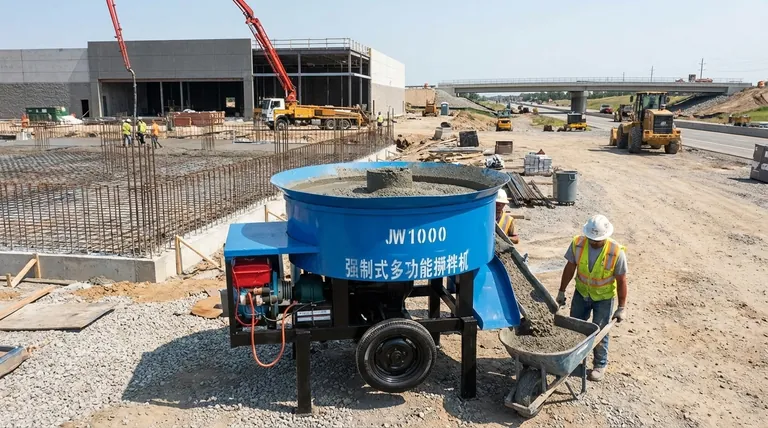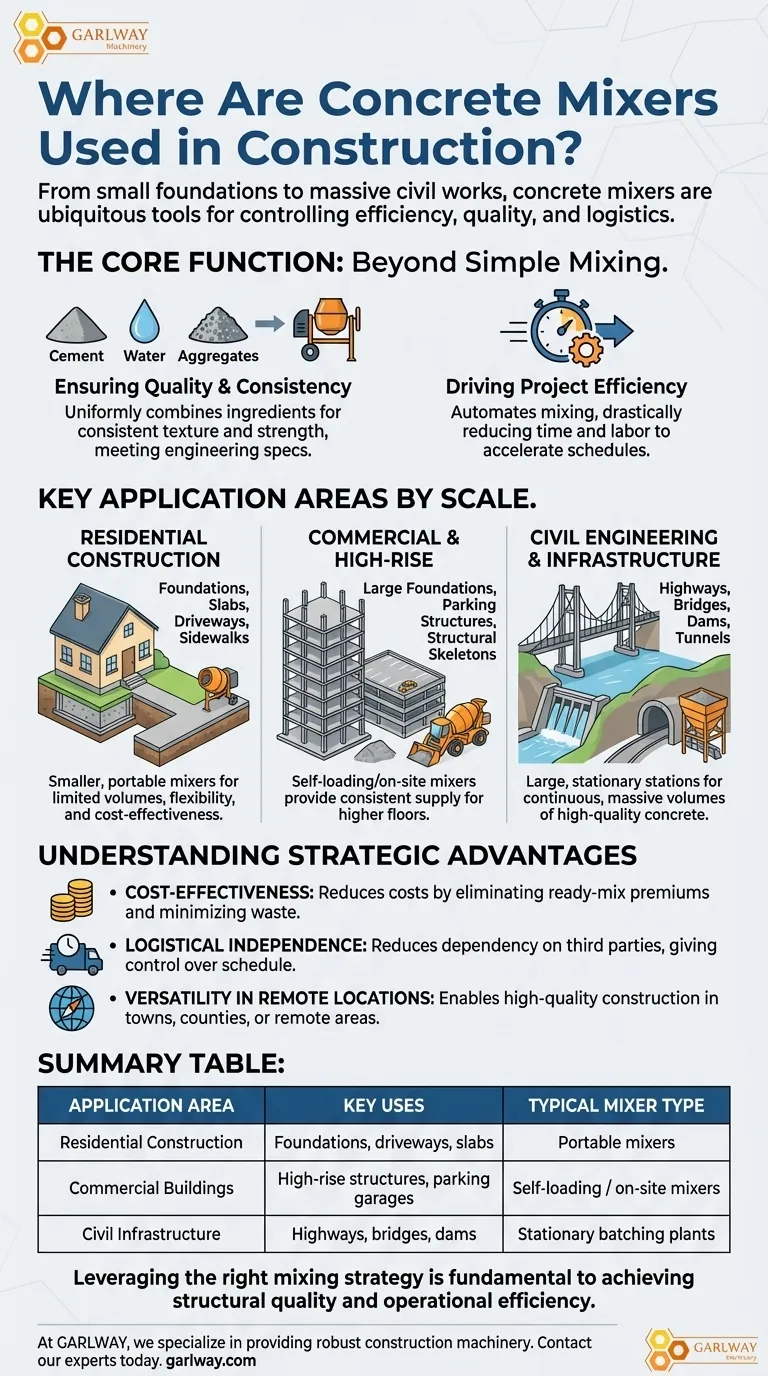At its core, the concrete mixer is a ubiquitous tool used across virtually every segment of the construction industry. Its applications range from small residential jobs like foundations and driveways to massive civil engineering works, including the construction of roads, bridges, and high-rise commercial buildings.
The widespread use of concrete mixers is not just about combining ingredients. It's about fundamentally controlling project efficiency, ensuring material quality, and solving logistical challenges, making this equipment indispensable at any scale.

The Core Function: Beyond Simple Mixing
A concrete mixer’s primary role is to create a homogenous mixture, which is critical for the final strength and durability of the structure. This process is far superior to manual methods.
Ensuring Quality and Consistency
The machine’s main purpose is to uniformly combine cement, water, and aggregates like sand or gravel.
This mechanical process guarantees that every batch has a consistent texture and strength, which is essential for meeting engineering specifications and ensuring structural integrity.
Driving Project Efficiency
By automating the mixing process, these machines drastically reduce the time and labor required to produce concrete.
This boost in productivity allows construction schedules to move forward more quickly, improving the overall economy of the project.
Key Application Areas by Scale
The type of construction project directly influences the type and scale of mixing equipment used. From a simple backyard patio to a sprawling highway, the need for well-mixed concrete is a constant.
Residential Construction
For residential projects, mixers are used for pouring foundations, slabs, driveways, and sidewalks.
Smaller, often portable, mixers are ideal for these tasks, offering flexibility and cost-effectiveness for the limited volumes of concrete required.
Commercial and High-Rise Buildings
In commercial construction, the demand for concrete is significantly higher. Mixers are crucial for creating large foundations, parking structures, and the structural skeletons of multi-story buildings.
Self-loading or on-site mixers are particularly valuable here, as they can provide a timely and consistent concrete supply to higher floors where traditional truck delivery becomes a logistical challenge.
Civil Engineering and Infrastructure
This category includes the largest projects, such as highways, bridges, dams, and tunnels.
These massive undertakings often require large, stationary concrete mixing stations to produce enormous volumes of high-quality concrete continuously and reliably.
Understanding the Strategic Advantages
Choosing to mix concrete on-site is a strategic decision that goes beyond convenience. It's about taking control of the supply chain and project timeline.
Cost-Effectiveness
On-site mixing, especially with self-loading or volumetric mixers, can significantly reduce costs.
It eliminates the premium paid for ready-mix concrete and minimizes waste, as you can produce the exact amount needed at the precise moment it is required.
Logistical Independence
Relying on external suppliers for concrete delivery introduces potential delays from traffic or batching plant issues.
Having a mixer on-site reduces dependency on third parties, giving project managers greater control over their schedule and workflow.
Versatility in Remote Locations
For projects in towns, counties, or remote areas, transporting ready-mix concrete can be impractical or expensive.
Smaller, more transportable mixing stations or self-loading mixers provide a powerful solution, making it possible to execute high-quality construction anywhere.
Making the Right Choice for Your Goal
The decision to use a specific type of concrete mixer should be based on the project's unique demands for scale, location, and speed.
- If your primary focus is a small-scale residential project: A portable mixer offers the best balance of cost and flexibility for tasks like foundations and driveways.
- If your primary focus is a mid-sized commercial building: On-site self-loading mixers provide crucial control over supply and help overcome the logistical hurdles of multi-story construction.
- If your primary focus is large-scale infrastructure: A dedicated mixing station is often the only way to meet the demand for massive and consistent volumes of concrete.
Ultimately, leveraging the right concrete mixing strategy is fundamental to achieving both structural quality and operational efficiency in any construction endeavor.
Summary Table:
| Application Area | Key Uses | Typical Mixer Type |
|---|---|---|
| Residential Construction | Foundations, driveways, slabs | Portable mixers |
| Commercial Buildings | High-rise structures, parking garages | Self-loading / on-site mixers |
| Civil Infrastructure | Highways, bridges, dams | Stationary batching plants |
Ready to optimize your concrete supply and project efficiency?
At GARLWAY, we specialize in providing robust construction machinery—including concrete mixers, winches, and batching plants—to help construction companies and contractors globally achieve superior results. Our equipment ensures consistent quality, logistical independence, and cost-effectiveness for projects of any scale.
Contact our experts today to find the perfect concrete mixing solution for your next project!
Visual Guide

Related Products
- Ready Mixer Machine for Construction Ready Mix Machinery
- Commercial Construction Mixer Machine for Soil Cement Mixing Concrete
- Auto Concrete Cement Mixer Machine New
- JDC350 Small Cement Concrete Mortar Mixer
- HZS90 Large Multiquip Concrete Mixers for Construction
People Also Ask
- How does a self-loading concrete mixer automatically load materials? Achieve On-Site Efficiency & Precision
- How does the mixing system of a twin-shaft forced concrete mixer function? Unlock Superior Mixing Efficiency
- What are the application scenarios for drum concrete mixers? Optimize Your Construction Projects
- What are the main structural elements prepared using concrete mixers? Build Strong Foundations & More
- How should project size influence mixer selection? Choose the Right Mixer for Your Construction Scale
- Why is it important to keep the concrete moving in a cement mixer? Ensure Quality and Strength
- How are the mixing blades designed in a drum mixer? Achieve Gentle, Homogeneous Mixing
- What is a volumetric mobile mixer? Maximize Flexibility and Minimize Waste On-Site



















